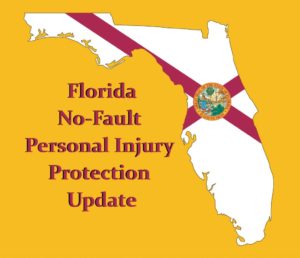
The decision to change Florida’s current No-Fault system, which requires Florida vehicle owners to carry personal injury protection (PIP), has been debated each recent year in the Florida legislature.
Florida’s No-Fault system means that people use their own insurance to pay for personal injuries caused in an accident, regardless of who is at fault. However, there are restrictions on how much insurance will pay so the at-fault driver/owner may have a claim against them for the full value of the injuries they caused.
According to The National Association of Insurance Commissioners, in 2018, Florida drivers were paying an average of about $1,300 yearly for car insurance. Your insurance premium is determined by the coverage you choose, but other factors weigh into the cost, such as age, credit, education, occupation, gender, marital status, where you live and drive, and driving record. It’s good to know that now we can show proof of insurance by showing a photo of the insurance card on our phones.
There are many kinds of car insurance policies for sale, but Florida has low requirements compared to most other states. The minimum requirements are $10,000 in PIP coverage and $10,000 in property damage liability coverage.
PIP Minimum Required
The minimum coverage of $10,000 covers 80% of the cost of medical care for accident related injuries, 60% of lost wages, some replacement services costs for household tasks, death benefits of $5,000, but if there was a deductible elected, you must first satisfy the deductible before receiving benefits. The higher your deductible, the lower your insurance premium.
Liability Property Damage Minimum Required
The minimum $10,000 property damage covers damages the at-fault driver does to another’s property.
Should I Buy Additional Insurance?
Because there are limits on how much will be covered by insurance, the at-fault driver/owner can be sued for additional damages that weren’t covered. If you have assets, additional insurance coverage can help to protect you from this type of loss.
Additional Insurance Options
Bodily Injury Liability Coverage
This kind of coverage will pay for the injured person’s medical expenses which were not covered by their own personal injury policy. Policy holders can purchase a minimum of $10,000 for bodily injury to one person and $20,000 total per accident. Consider purchasing more extensive coverage if you earn a higher income or have assets needing protection.
Uninsured/Underinsured Motorists Coverage: When You Need it, Will you Have it?
This is one of the most important coverages you should have. The Insurance Research Council estimates that 27% of Florida drivers do not have car insurance, even though uninsured driving can result in loss of license and criminal charges. In some parts of Florida the percent of uninsured drivers is even higher. Unless you have uninsured motorists coverage, if you are injured by someone without insurance, you are limited to receiving the benefits of your own PIP policy. You can also be injured by someone without enough bodily injury liability coverage to compensate you for your injury; this is called an underinsured motorist. Uninsured/Underinsured motorists coverage provides compensation for pain, suffering and lost wages, and in the most tragic cases, wrongful death.
Comprehensive Property Coverage
This kind of policy covers property damage to your vehicle due to weather, theft, fire, vandalism, and collisions with objects other than another vehicle. If your car is totaled by an accident, comprehensive coverage can compensate for the fair market value of the vehicle.
Umbrella Coverage
An Umbrella Policy provides additional liability coverage when the underlying liability coverage limit has been met. This can protect your assets in the case of a significant damages claim made against you.

